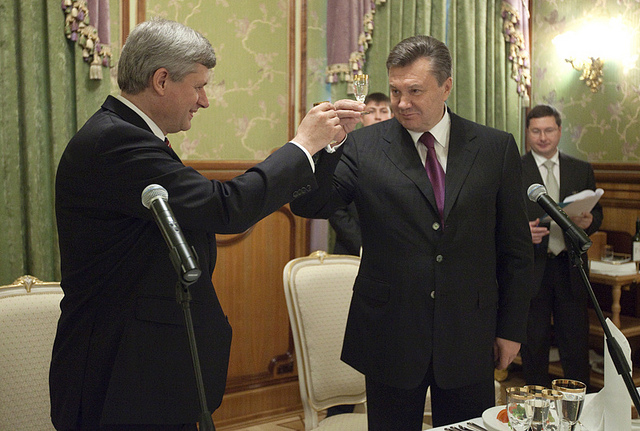Decent people everywhere are praying that Stephen Harper is in Ukraine this weekend to lay the law down to the country’s new government — at least privately. The civilized world, Mr. Harper will surely make clear, will not tolerate the presence of neo-Nazis and anti-Semites in that government.
For his own political reasons, the Canadian PM will continue his apparently unconditional embrace of Prime Minister Arseniy Yatsenyuk’s unelected government. But in private, we must hope, he will tell Yatsenyuk that it is intolerable and unacceptable that his government contains seven ministers connected to the radical right, including members of the extremist Svoboda Party as deputy prime minister and ministers of defence, agriculture and ecology.
Anti-Semitism, as we all know, has no more uncompromising a foe than Stephen Harper and his government. They even denounce it where it does not exist. So we can be sure they must be outraged by Svoboda, even though in public, strangely enough, they have been silent as the grave.
Given his newfound pre-occupation with Ukraine, Mr. Harper will surely know that only 16 months ago, the European Parliament expressed concern about Svoboda’s growing support, emphasizing that “racist, anti-Semitic and xenophobic views go against the European Union’s fundamental values and principles.” The E.U. actually appealed to “pro-democratic parties [in Ukraine]…not to associate with, endorse or form coalitions with” Svoboda, an admonition Yatsenyuk’s new government has totally ignored.
It’s true that some pooh-pooh these accusations against Svoboda and other far-right Ukrainian groups such as the Right Sector. But on these issues, Mr. Harper and his team have always gone to the source: Jews themselves. So, for example, they must be familiar with the prolific writings of Oleksander Feldman, president of the Ukrainian Jewish Committee, typical of which is the article headlined “The Sad Progression of the Ukrainian Protest Movement From Democracy and the Rule of Law to Ultra-nationalism and Anti-Semitism.”
I’d bet, too, that the Jewish Telegraphic Agency (JTA), an “international news agency serving Jewish community newspapers and media around the world,” is well-known to Mr. Harper. Exactly one year ago, JTA reported that “Ukrainian Jews worry that [the] rise of Svoboda party will bring anti-Semitism back into vogue.”
This fear is shared by other prominent western European Jews. In the pungent words of Joel Rubinfeld, co-chair of the European Jewish Parliament, “Svoboda lifted the lid from the sewer of anti-Semitism in Ukraine and it’s spilling out.”
Svoboda’s history, including its ties to extremist Ukrainian movements ideologically aligned with Nazism, is no secret. Yet the party garnered more than 10 per cent of the vote in the 2012 elections, becoming the country’s fourth-largest party and making itself, in the words of Ukrainian Jewish Committee president Feldman, “perhaps the biggest challenge facing Ukrainian Jewry today.”
The U.S. State Department concurs in this assessment, a recent report naming Ukraine as a place of “concern” because of growing anti-Semitic political parties.
It is not yet known whether Mr. Harper intends this weekend to meet Svoboda Party leader Oleh Tyahnybok, who has called Jews “kikes” and has praised his own supporters for being the “worst fear of the Jewish-Russian mafia.” Like other European neo-Nazi and ultra-nationalist movements, Tyahnybok has also attempted to establish good relations with Israel. But Mr. Harper will not be fooled by such ploys, understanding that Israeli policy has long been to make friends where it can find them, however unsavory they may be. Just as critics of Israel are not automatically anti-Semitic, “friends” of Israel may well be racist bigots.
But Svoboda is not the only concern that Mr. Harper must raise. Barely six months ago, the World Jewish Congress (WJC) urged Ukrainian clergy to refrain from attending neo-Nazi events. The letter by WJC President Ronald Lauder to the head of the Ukrainian Orthodox Church, Patriarch Filaret, was reported by the JTA. Lauder pointed to “a recent ceremony near Lviv marking the 70th anniversary of the creation of the Galician division of the Waffen SS….I was horrified to see photographs…of young Ukrainians wearing the dreaded SS uniform with swastikas clearly visible on their helmets as they carried the caskets of members of this Nazi unit, lowered them into their new graves, and fired gun salutes in their honour. I was especially troubled by the participation in this ceremony of a priest of the Ukrainian Orthodox Church that appeared to give a religious legitimacy to the rehabilitation of the SS.” Perhaps Mr. Harper’s mysterious Office of Religious Freedom could investigate.
To complete the picture, WJC President Lauder noted that “Oleg Pankevich, a lawmaker for the extreme-right Svoboda party, also took part in the reburial ceremony.”
We have the right to expect that while in Kyiv, Mr. Harper will be speaking truth to Ukrainian power — perhaps privately but in no uncertain terms. We have the right to expect him to demand that the new Ukrainian government takes immediate steps to separate itself from Svoboda and all other extremist influences. Otherwise, he must surely declare, neither Canada nor the other liberal democracies can continue to give it support.
This article originally appeared in The Globe and Mail.
Image: flickr/pmwebphotos



